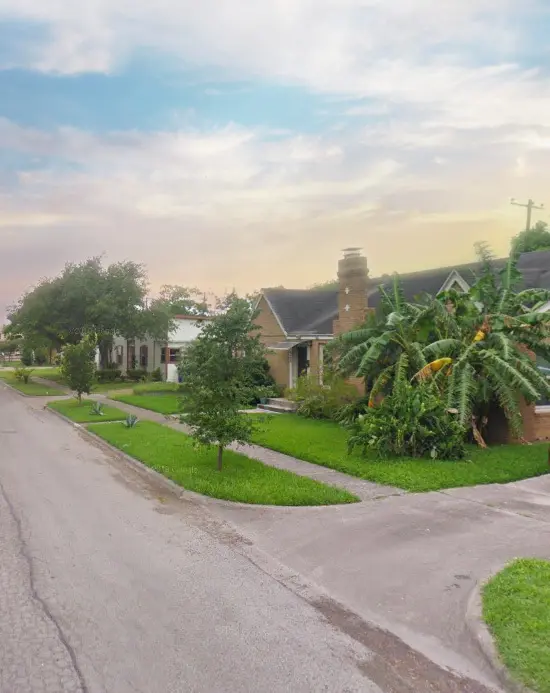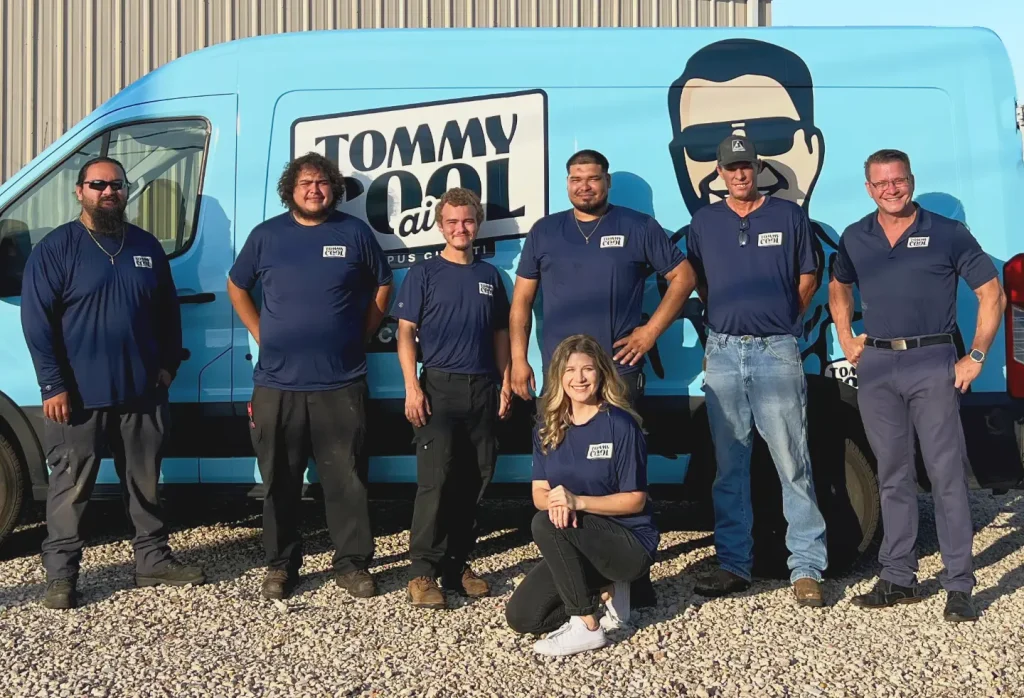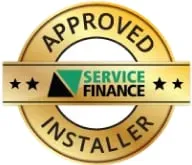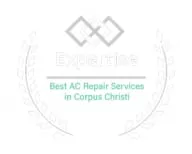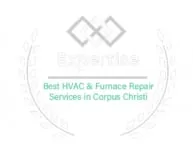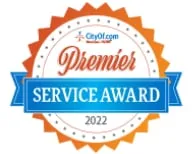6 TROUBLESHOOTING STEPS WHEN YOUR AC BLOWS HOT AIR
Your air conditioner is working hard for much of the year keeping you cool hopefully no matter how hot it gets in Corpus Christi. But unfortunately, sometimes that demand becomes too much for a home’s system. You might not always catch problems with your AC, but some problems are too obvious to miss.
An air conditioner starting to blow warm air is a major red flag that something is wrong with your home’s HVAC system. It could appear to be sounding like it’s running fine but it has stopped blowing out the cool air it’s supposed to. It doesn’t take long for a Corpus Christi home to start heating up when the AC is no longer cooling.
The good news is that even if an air conditioner is blowing warm air, that doesn’t mean it is an expensive fix. Some minor issue or one that is easy to fix may be the cause of the problem. An AC that has stopped blowing cold air may be repairable. In fact, a professional HVAC technician, like those at Tommy Cool Air, can likely get your cooling system back up and running in no time.
Steps to Identify a Cooling Problem
To help you troubleshoot, here are some essential steps you can take:
Set your thermostat to AUTO: Ensure that your thermostat is set correctly. This simple adjustment can sometimes solve the issue.
Replace dirty air filters: Clogged filters can obstruct airflow, leading to inefficient cooling. Make it a habit to check and replace them regularly.
Look and listen: Pay attention to your AC unit for any hissing or rattling sounds. Also, check for extra moisture around the unit, as these can be signs of an internal issue.
Contact a professional HVAC technician: If the problem persists, it’s wise to seek professional help. Skilled technicians can diagnose and fix issues efficiently, often preventing more significant problems down the line.
By following these steps, you can better understand what might be causing your AC to struggle and take action before the heat gets unbearable.

BEFORE CALLING FOR REPAIR SERVICE: HOMEOWNER TROUBLESHOOTING STEPS
Before even calling for a professional repair, you may want to check out a few things on your own. It is possible that the issue why your AC is not blowing cold air is so simple, you can fix it yourself!
Here at Tommy Cool Air, we receive calls all the time from people across Corpus Christi in distress over a broken air conditioner. There are times when we go out to service an HVAC system, we find it only required very minor and easy fixes. While we are more than happy to service your broken cooling system, we want to provide you with information that may help you avoid having to pay for a service call altogether.
How Can I Control the Air in My AC to Reduce Energy Waste?
Controlling your AC effectively not only enhances comfort but also minimizes energy waste, saving you money. Here are some strategies to optimize AC efficiency:
1. Adjust Thermostat Settings
- Set to AUTO: Use the AUTO setting on your thermostat. This allows your AC to automatically regulate airflow, turning the fan on only when heating or cooling is necessary.
- Optimal Temperature: Aim for a comfortable yet efficient temperature setting. During summer, around 78°F (26°C) is often recommended when you’re at home.
2. Regular Maintenance
- Filter Replacement: Change AC filters every 1-3 months to ensure proper airflow and system efficiency.
- Professional Tune-Ups: Schedule annual maintenance checks. A professional can clean components and check for issues that might hinder performance.
3. Efficient Home Practices
- Seal Leaks: Inspect windows and doors to make sure there are no drafts. Sealing leaks prevents cool air from escaping and warm air from entering.
- Insulate Well: Proper insulation keeps your home at a stable temperature, reducing the workload on your AC.
4. Smart Technology Use
- Smart Thermostats: Install a smart thermostat from brands like Nest or Ecobee. These can learn your habits, adjust settings automatically, and be controlled remotely via smartphone.
Signs of Energy Waste
Unsure if your AC is still wasting energy? Look out for these indicators:
- Uneven Cooling: Different temperatures in various rooms.
- Frequent Cycling: The AC turns on and off more than usual.
By fine-tuning these elements, you can maintain control over your AC and curtail unnecessary energy waste, all while keeping your home comfortably cool.
Unlocking Energy Efficiency with Air Sealing and Insulation
In the quest to enhance your home’s energy efficiency, two upgrades stand out: air sealing and insulation. These techniques work hand-in-hand to dramatically reduce energy waste, offering both environmental and economic benefits.
How Air Sealing Tackles Energy Waste
Air sealing addresses the numerous gaps and cracks found in a home’s structure. By meticulously closing these spaces, it prevents unwanted outdoor air from infiltrating your living spaces. This action ensures that your heating and cooling systems aren’t overburdened. With reduced strain, these systems consume less energy, which not only extends their lifespan but also cuts down your utility bills. Improved air quality and lower humidity levels are added bonuses, making your indoor environment healthier.
The Role of Insulation in Energy Conservation
Insulation complements air sealing by maintaining consistent indoor temperatures, regardless of weather fluctuations outside. This high-performance barrier ensures that your home retains heat during winter and stays cool during summer, requiring less energy to maintain comfort. As a result, your home’s overall energy consumption decreases, which lowers carbon footprint and reduces energy costs.
Incorporate these upgrades into your home to not only create a comfortable environment but also contribute to a more sustainable future. For those seeking detailed guides on installation, reputable resources are available to help you make informed decisions.
HOMEOWNER TROUBLESHOOTING STEPS FOR AC BLOWING HOT AIR

#1: CHECK THE THERMOSTAT
Check to make sure that your thermostat is set to COOL. If it is set to only FAN or HEAT, then switch it to COOL.
And check to see if it is set to be COOLER than the current temperature. Perhaps someone changed the setting without you knowing. Just lower the thermostat setting to a number below the current temperature in your home.
#2: CHECK VENTS THROUGHOUT YOUR HOME
Do you see that any of your vents are closed? If so, open them. Closed vents can cause problems with the air flow and cause your AC to blow warm. It’s a common misconception that vents should be closed in room not in use, but that is not correct. While a couple closed vents may be okay, too many can cause a problem.
#3: CHECK THE INDOOR HVAC UNIT
Most HVAC systems have a portion of the air conditioning system (the evaporator) located inside the home often in a closet or the attic. This evaporator absorbs heat from the air and transfers it to your outdoor AC unit (the condenser). This indoor unit has the fan that blows conditioned air through your home, and it does this even if your outside unit is not working. Check to make sure you hear the blower motor running.

#4: CHECK YOUR AIR FILTER
Is your filter dirty or clogged? While you are examining the inside unit, take a look at your air filter. If it is dirty or clogged, that could be the reason why your air conditioner isn’t blowing cold air. Simply changing it out for a clean air filter may get your system working correctly again.
To keep your air conditioner running efficiently, it’s crucial to know when to replace these filters. Generally, air filters should be changed every 90 days. However, certain conditions might require more frequent replacements:
- Home Size: Larger homes can put more strain on filters, potentially requiring swaps more often.
- Indoor Pets: Pets shed hair and dander, which can quickly clog filters.
- Smoking or Vaping: These activities introduce additional particles into your home’s air.
- Allergies: If anyone in your household suffers from allergies, cleaner air is essential, and more frequent filter changes can help.
By understanding these factors, you can better maintain your AC system and ensure it operates at peak performance. Regularly changing your air filter not only keeps the air in your home clean but also extends the life of your HVAC system.
Regular Maintenance for Efficient AC Operation
To ensure your air conditioner works efficiently, it’s crucial to clean the AC coils regularly. It is generally recommended to clean the coils at least once a year. Regular cleaning helps prevent the unit from blowing warm air and maintains optimal performance.
Key Reasons to Clean Annually:
Energy Efficiency: Clean coils reduce energy consumption and lower your electricity bills.
Extended Equipment Life: Dirt and debris can cause wear and tear, but regular cleaning helps prolong the lifespan of your AC.
Improved Air Quality: Dust-free coils enhance indoor air quality by minimizing allergens circulating in your space.
Signs It’s Time for a Cleaning
- Your AC is not cooling as effectively as it should.
- There’s an increase in energy bills without increased usage.
- Noticeable dust accumulation near vents.
By incorporating this annual maintenance into your routine, you ensure that your AC runs smoothly and efficiently all season long.
#5: CHECK THE OUTSIDE AC UNIT
Look at your condenser for problems. Is there frost or ice on it? What about leaves or debris? Your outdoor AC unit braves the elements year-round, so it’s no surprise that dirt and debris can gather. While a few leaves might seem harmless, they can cause significant issues.
Debris buildup around your unit can lead to overworking and overheating. This happens when airflow is restricted, forcing the system to work harder than necessary. The result? Your AC could end up blowing warm air instead of the cool relief you expect.
To prevent these issues, make it a habit to regularly check and clear any obstructions around your unit. A little maintenance goes a long way in ensuring your AC runs efficiently, saving you from unexpected repairs.
If it is frozen or has frost, change the setting on your thermostat from COOL to FAN. Let that run for as much as 12 hours to help your unit thaw. A frozen condenser is often caused by a dirty air filter, which is another reason why making sure you regularly change your filter is so important.
A frozen unit can happen when the coils on your evaporator become dirty or clogged. If that’s the case, clean the coil if you can access it. To get a good clean coil may require the coil is pulled out of the space it is in and Tommy Cool Air can help you with that.
If you do one of these steps and it only solves your problem temporarily, you may have a more serious issue. If the AC freezes up again, call Tommy Cool Air for 24/7 emergency AC repair service at (361) 852-4450. A freon leak could be what is causing the problem. We can come out and handle any potential leak, refill the system, and ensure it is back to working properly and safely.
When your AC isn’t blowing cold air, low refrigerant levels might be the culprit. Listen for a distinct hissing noise from the refrigerant lines—this could be a sign of a leak. Additionally, be on the lookout for ice buildup on your evaporator coils, especially if the unit is blowing warm air. These coils may be hidden, but if your system freezes up, it’s a possible indicator.
Important Steps to Take:
Turn Off Your AC: If you suspect a refrigerant leak, it’s crucial to switch off your AC immediately. Continuing to run it can cause further damage and poses health risks.
Understand the Risks: Refrigerant leaks can be toxic. Exposure may lead to sickness, so it’s imperative to act quickly and safely.
Seek Professional Help: Contact an HVAC professional to assess and repair the issue. Handling refrigerants requires expertise and adherence to safety standards.
For any emergency repairs or if you suspect a freon leak, our team is ready to assist 24/7. Let us ensure your system is refilled and operating safely, so you can enjoy a cool and comfortable environment once more.
Identifying a Malfunctioning Compressor in Your AC Unit
A malfunctioning compressor is a key issue in an air conditioning system and pinpointing it can save you from further headaches. Here are the telltale signs that your AC compressor might be in trouble:
Lack of Cold Air: One of the most obvious signs is if your air conditioner is not blowing cold air. This is often a direct result of a faulty compressor failing to circulate refrigerant properly.
Unusual Noises: If you hear rattling, banging, or other odd sounds coming from your AC unit, it could indicate that the compressor parts are misaligned or deteriorating.
Physical Vibrations: Feeling excessive shaking or vibrations in your AC system is another sign of compressor issues. This can mean internal components are failing or imbalanced.
Moisture Leaks: Finding moisture or leaks near your AC could indicate problems with the compressor seal, leading to refrigerant leaks.
Recognizing these symptoms early can help in addressing compressor issues promptly, ensuring your air conditioning unit runs efficiently and effectively.
#6: CHECK YOUR HOME’S POWER
If you see that your AC isn’t blowing any air at all, then another thing to check is your home’s power supply. You may have blown a fuse and need to turn a switch back on inside your breaker box.
However, if your AC is running but only blowing warm air, you might be dealing with a tripped circuit breaker. Most AC units have two breakers: one inside your home and one outside.
First, inspect these breakers. If the outdoor breaker is tripped, it can cause the AC to function improperly, leading to that unwelcome blast of warm air.
A simple solution can often be found by resetting the tripped breaker. Just flip the switch back to the “on” position, and your AC should resume blowing cool air.
With these quick checks, you can potentially solve the problem without needing to call in professional help.
The Impact of Duct Leaks on AC Efficiency and Home Comfort
When you set your air conditioning system into action, you expect cool air to travel seamlessly through your home’s ducts, reaching every room. However, this journey isn’t always as smooth as planned.
The Challenge of Duct Leaks
Over time, air ducts can develop gaps or cracks through subtle shifts and wear. These small openings become escape routes for the cool air meant to keep your rooms comfortable. Instead of maintaining a consistent temperature, this escaped air often finds its way into attics or other unused areas, reducing the efficiency of your AC system.
Consequences on Home Climate
When your ducts leak, the system works harder to compensate for the lost air, which means more warm air might circulate in your living spaces, making it challenging to cool your home effectively. This not only compromises comfort but can also result in uneven temperatures across different rooms.
Efficiency Loss and Cost Implications
Energy Star reports that a significant 20–40% of conditioned air can be lost through duct leaks. Such wastage not only drives up energy bills but also puts additional strain on your AC system, leading to more frequent maintenance issues.
The Solution
To prevent such inefficiencies, it’s crucial to ensure proper air sealing and duct insulation. Addressing leaks in aging ductwork can significantly enhance both cooling efficiency and overall home comfort, ensuring your AC delivers its best performance year-round.
Enhance Your AC Efficiency with Air Sealing and Insulation
When it comes to maintaining a cool, comfortable home year-round, two upgrades stand out for boosting efficiency: air sealing and insulation. But what makes these two solutions so crucial for your air conditioner’s performance? Let’s dive in.
Prolonging Your AC’s Lifespan
By properly sealing and insulating your home, you effectively reduce the demands placed on your air conditioning system. This reduced workload can help extend the life of your AC unit, saving you on costly repairs and replacements. This means during those scorching summer months, your home remains pleasant with less energy expenditure.
Improving Air Quality
Air sealing is all about closing gaps and cracks throughout your home. This keeps unwanted outdoor air from infiltrating your space, thereby maintaining indoor air quality and keeping humidity at bay. As a result, your entire living environment becomes healthier and more comfortable.
Battling Temperature Extremes
With high-performance insulation, your home gains a robust barrier against fluctuating outdoor temperatures. Effective insulation ensures that during both hot summers and cold winters, the internal temperature of your home remains stable. This optimization allows your air conditioner to operate more efficiently without overexertion.
Investing in comprehensive air sealing and insulation not only enhances the efficiency of your air conditioning system but also contributes to a sustainable living environment with reduced energy costs. Leverage these upgrades to enjoy a cooler home and lower utility bills all year round.
STILL CONFUSED? CALL THE CORPUS CHRISTI AIR CONDITIONER EXPERTS
When in doubt, give us a call at (361)852-4450. We will be happy to come out and diagnose exactly why your air conditioner stopped blowing cold air. We will work to quickly resolve the problem and get the temperature back down in your home.
Tommy Cool Air has worked on thousands of HVAC systems over the years across the Corpus Christi area. Our team of highly skilled AC technicians reliably deliver quality service handling all sorts of HVAC problems, big and small. We are known for handling repairs quickly and at a very fair price – just read the glowing customer reviews people across Corpus Christi has given Tommy Cool Air!

When it’s time for you to get new air conditioning, we can work with you to make sure we install exactly the right cooling system for your needs. Give Tommy Cool Air a call today for the AC work your home needs – (361)852-4450. Call us any time of day. We are even available for 24/7 Emergency Service.
How to Upgrade Your AC System Without a Big Initial Investment
Are you tired of struggling through scorching summers with an inefficient air conditioner? You might be eligible for an energy-efficient HVAC upgrade without breaking the bank. Here’s how you can get a new AC system at little or no upfront cost:
Explore Energy-Efficient Incentive Programs
Start by researching available energy efficiency programs in your area. Local governments, utility companies, and even federal initiatives often offer incentives to promote greener energy solutions. These programs might cover the cost of an upgraded HVAC system, allowing you to pay very little upfront.
Check for Financing Options
Many HVAC companies offer financing plans that spread the cost over time. This means you can enjoy the benefits of a new, energy-efficient system without a heavy initial payment. Look for plans that offer low-interest rates and flexible terms that fit within your budget.
Take Advantage of Customized Home Solutions
Seek out services that provide personalized energy solutions. These providers evaluate your home’s specific needs and devise a plan that maximizes energy savings. By implementing a whole-house approach, you could potentially reduce energy consumption by up to 50%.
Partner with Certified Contractors
It’s crucial to work with certified home performance contractors. They not only ensure that the installation is done correctly but also often include no-cost assessments to determine how to optimize your home’s energy efficiency.
Simple Qualification Process
Getting started is easy. Many programs and companies offer a quick, no-obligation assessment—usually just a brief questionnaire—to determine if your home qualifies for the upgrade. This simple step could open the door to a cooler, more energy-efficient home this summer.
By exploring these options, you could soon be enjoying a comfortable home environment without the financial strain.
When is it Time to Replace Your AC Unit?
Recognizing the right moment to replace your air conditioning unit can save you money and keep your home comfortable. Here are a few signs that may indicate it’s time to consider an upgrade:
Frequent Breakdowns: If your AC unit requires constant repairs and still struggles to maintain a consistent temperature, it might be nearing the end of its lifespan. Constant maintenance not only adds up in cost but can also create unnecessary stress.
Rising Energy Bills: Notice your electricity expenses creeping up during the warmer months? An inefficient AC can consume more power to achieve the same cooling effect, reflecting in higher utility bills. Upgrading can help you benefit from modern energy-efficient technology.
Your AC is Over 10-15 Years Old: Most air conditioning systems have a lifespan of around 10-15 years. As they age, efficiency decreases, and the likelihood of breakdowns increases. If your unit falls within this range, starting to explore new options is wise.
Inconsistent Cooling: If some areas of your home never seem to cool properly, even when the AC is running at full blast, it might be due to advancements in new systems that offer better, more comprehensive cooling.
Strange Noises or Odors: Unusual noises or musty smells can indicate severe issues within your system. These issues may range from failing components to mold or mildew inside the unit.
Weighing Your Options
While replacing your AC, consider budgeting between $5,000 and $15,000 for a new system, excluding potential ductwork repairs or additional heating systems. However, some programs and incentives can make this investment more manageable:
- Government Rebates: Look into local, state, or federal energy efficiency programs that might offer rebates or credits.
- Financing Plans: Many HVAC companies provide financing options to spread out the cost over time.
- Energy-Efficient Upgrades: Investing in a modern, energy-efficient heat pump could offer long-term savings on your monthly energy bills, making it worth upfront costs.
Explore New Technologies
Modern AC units and heat pumps offer significant advancements in energy efficiency and performance over older models. These systems not only lower your carbon footprint but also ensure a comfortable living environment that adapts to your needs.
Ultimately, the decision to upgrade should balance the current state and age of your unit with the potential benefits a new system could provide. By considering these indicators and options, you’ll be better equipped to make a smart, informed choice for your home’s comfort.

